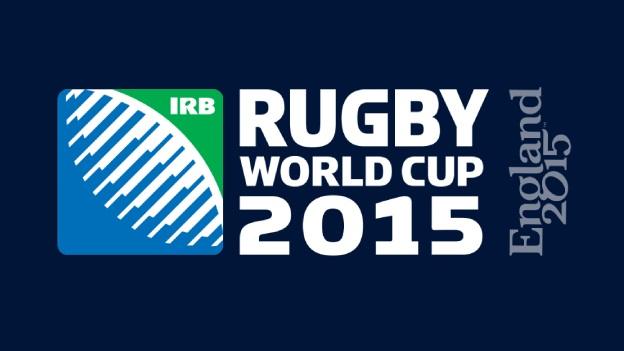Rugby World Cup 2015: England make 'shaky' start against Fiji
- Published
- comments
How do you start a tournament that has been talked about for four years, cost £150 million to host, seen 2.4 million tickets sold and begun with 80,000 people roaring from all sides of a sold-out stadium?
By letting the kick-off bounce, as if it were an under-11s game on a muddy school playing field.
England recovered from that inauspicious first act, if not to flourish or necessarily frighten the bigger boys who lie in wait over the next month and a half.
What they might go on to do now is almost as uncertain as those first few seconds. For while a 35-11 win over a team ranked ninth in the world appears an encouraging opener, this team and this tournament are in the same state: full of promise, as much about ambition and anticipation as solid achievement.
Twickenham played host to a wonderful atmosphere but an ordinary performance. While the stadium itself looked both familiar and entirely new, as if you had popped round to an old mate's house to find he had redecorated the entire ground floor, England were as they have been for much of the Stuart Lancaster regime: spirited yet often anxious, full of passion but sometimes short of pragmatism, victorious but often flawed.
More from rugby: |
|---|
For the latest rugby union news, follow @bbcrugbyunion, external on Twitter |
You can forgive opening night nerves. When France hosted their own World Cup eight years ago they found themselves upstaged and upended by an Argentina side, external who refused to play the supporting role allotted to them.
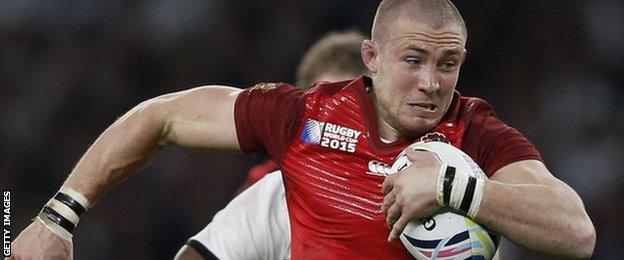
Mike Brown scored two tries as England began their World Cup campaign with a 35-11 win over Fiji
England instead began at a canter. With 20 minutes gone they were 15 points up and playing against 14 men who appeared unable to match their old-fashioned forward power.
That should have been it, for all Fiji's dash and muscular daring. Instead, with 15 minutes remaining, England sat a mere converted try ahead. Had their opponents landed their several kickable penalties, the anxiety around the half-cut stands would have turned into full-blown panic.
The battles of the next two Saturday nights, when Wales and Australia come armed with greater weaponry yet, will tell us whether this performance sets the tone for English involvement in this tournament or merely represents a shaky start to soon be forgotten.
But while superior fitness and the power and control exerted by an impressive set of replacements calmed those nerves, the foundations of this performance will concern Stuart Lancaster and his specialist coaches.
England's scrum, the cornerstone to both their historic triumphs and the best displays of this particular team, continued to look as vulnerable as it had in their warm-up games.
Three of their eight scrums were lost, the most costly coming on their own five-metre line and leading directly to the first Fijian try.
At the breakdown they were short of control and often overwhelmed. Seven rucks were lost, a startling 16 turnovers conceded. Trepidation about the damage the more vaunted Wales and Wallaby back rows might wreak over the next fortnight is unlikely to dissipate.
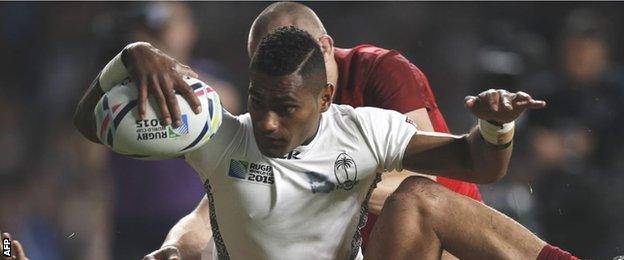
Fiji's Nikola Matawalu was denied a try as he dropped the ball just short of the try line
The pressure told. Eleven penalties were conceded, even if referee Jaco Peyper had an over-cautious evening. The big ball carriers failed to make enough yards. The half-back pairing of Ben Youngs and George Ford, denied a solid platform, wobbled further.
Fijian flair has wrecked better teams before. For England to miss 16 tackles, even against 20-stone wingers and flankers built like fire engines, nevertheless sends alarms clanging.
So too does the team's approach in the fog of battle. Having smashed through the Fijian defence with an unstoppable rolling maul to win an early penalty try, more seasoned teams would have returned to such lucrative tactics to profit again.
Instead England looked to go wide when the speed of ball or shape of play seldom merited it, too often sucked into trying to match Fiji's own harum-scarum invention when a more prosaic approach would have brought greater dividend.
Great sides aren't built on slick hands and stepping feet alone. No child grows up dreaming of becoming a pragmatist, yet sometimes sensible is the only way to be. Play the odds not the maverick, at least until the opportunities have been earned.
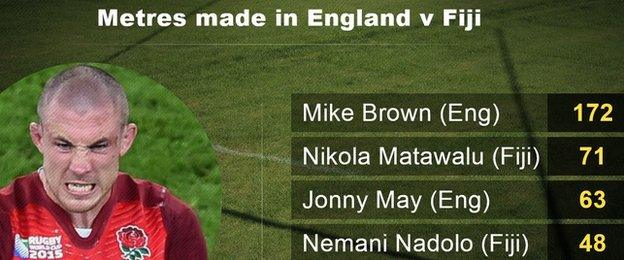
Brown made 101 more metres than any other player in the match
England have started slowly before in World Cups only to find a style and momentum as the tournament has developed.
Having lost to New Zealand in their opening match of the 1991 showdown they went on to reach a final they probably should have won; eight years ago they were humiliated 36-0 by South Africa, external in the group stages before scrapping through to meet the same opponents in the final and coming within a stud or two of Mark Cueto's left boot of shocking them further.
As his reign began, Lancaster showed a chart to his RFU bosses which showed that the average World Cup-winning team had 663 caps in its starting XV. As judgement approaches, his own first-choice team features at least 200 fewer than that, reflecting a side both in perpetual transition and in search of its true core.
This is a team that has won back the affection of a nation that had lost faith following the bad behaviour and dismal displays at the last World Cup.
It is also one that has lost one big game a year in the Six Nations and at least one every autumn against the might of the southern hemisphere.
There is immense promise in Ford and Jonathan Joseph, in the rampaging Courtney Lawes and Billy Vunipola. There is also a back row that can lack balance, a callow centre partnership and a first-choice hooker who is not in the squad.
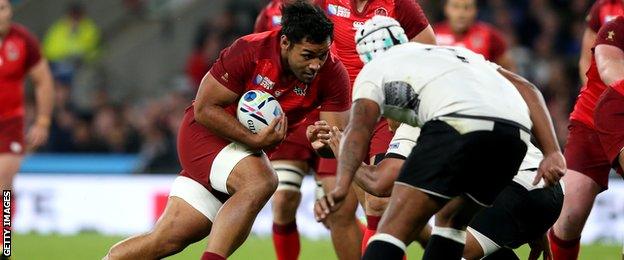
Billy Vunipola scored England's fourth and final try to earn a valuable bonus point for the hosts
Britain now hosts these big global sporting events with both style and unmatched support. The 2012 Olympics flowed into the Tour's Grand Depart and the Commonwealth Games a summer ago.
To keep that wonderful sequence flowing, England's rugby team must now convert all that potential as effectively as Great Britain's athletes did in and around the capital three years ago.
How will success be judged? Probably only in reaching their fourth final in eight attempts. It is a mighty task, even as the opportunity to spark another celebration of sport promises so much.
- Published25 September 2015
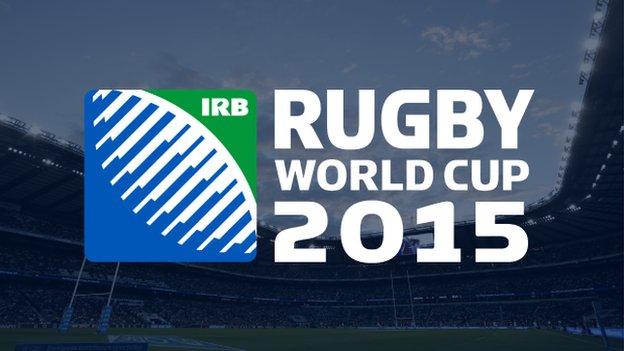
- Published14 September 2015
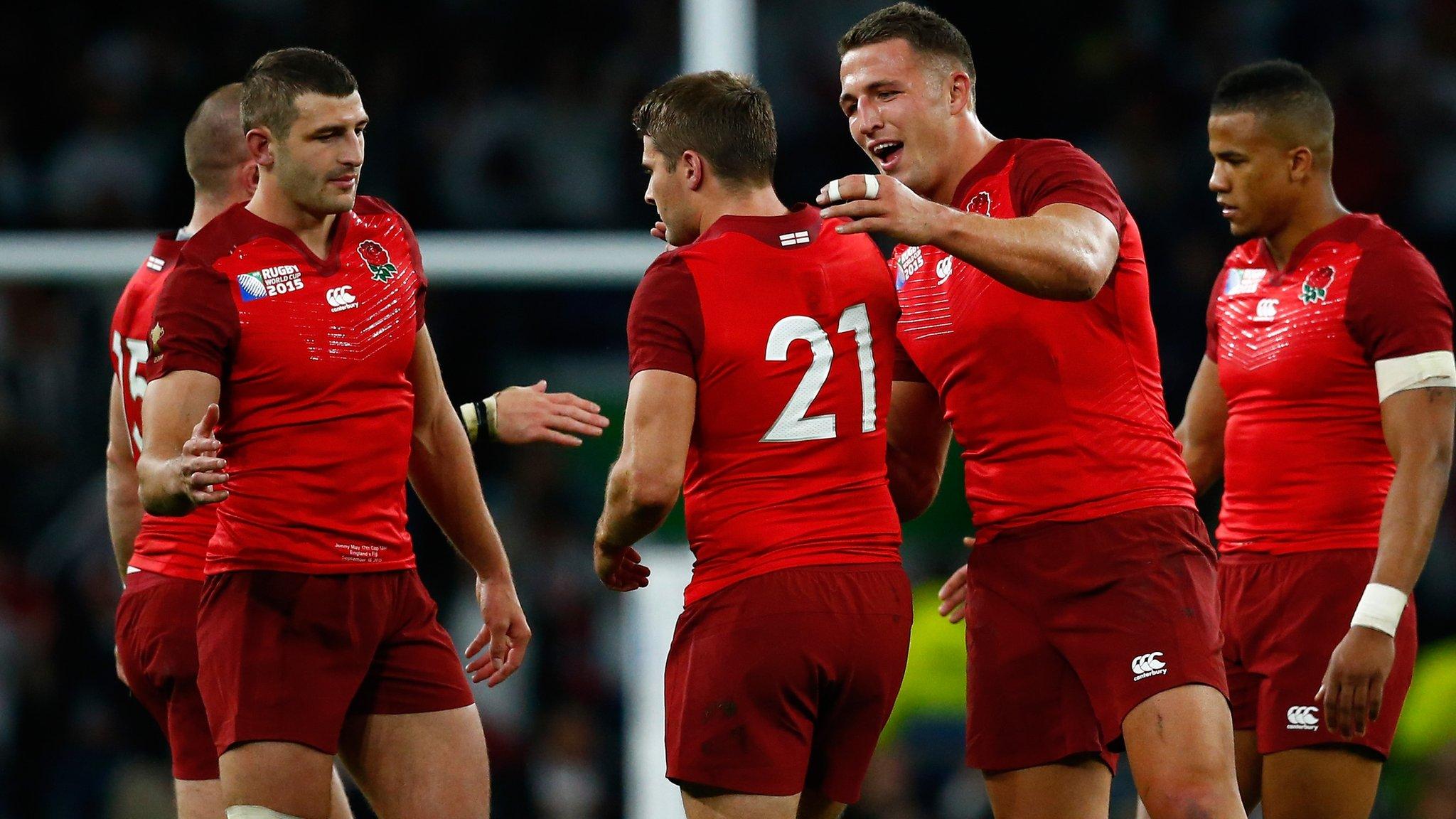
- Published18 September 2015
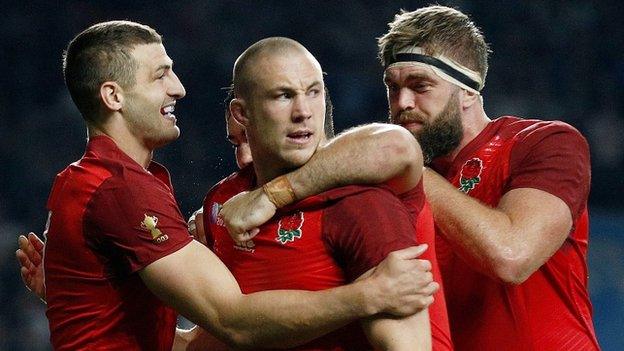
- Published18 September 2015
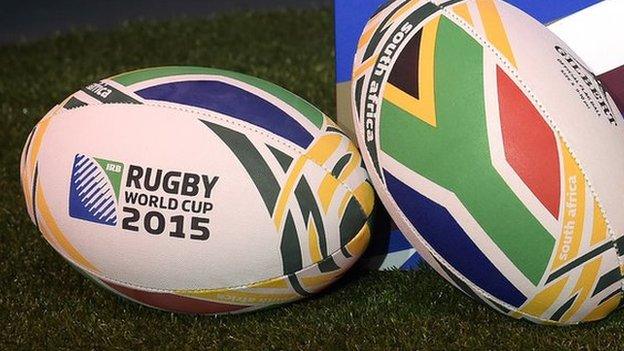
- Published3 February 2017

- Published14 September 2016

- Published15 February 2019

- Published8 September 2015
